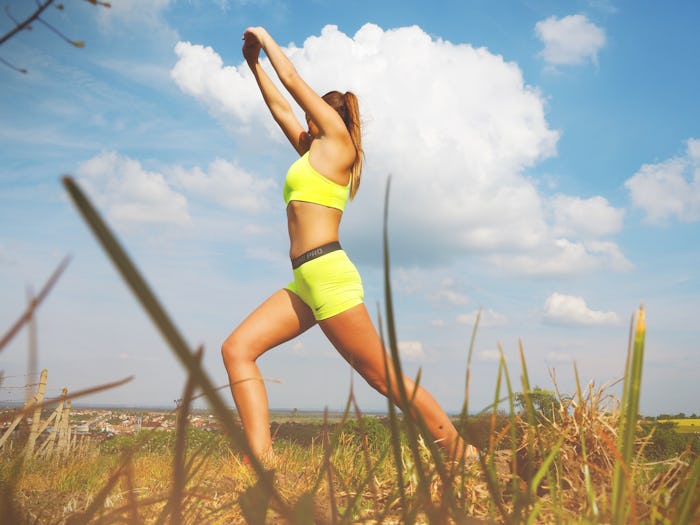Life
The summer sun may be very inviting when viewed from your window, but as soon as you step outside, the warmth becomes a brutal enemy. You run the risk of burns, dehydration, and exhaustion, especially if you plan on working out beneath the summer sun. Even the most experienced workout warriors need tips for working out in the heat, because the dangers of heat exhaustion and heat stroke are no joke.
Although you may want to push hard with your training all summer long, sometimes knowing when to back off is the best thing you can do for your health. Of course, following the basic tips like drinking enough water and seeking shade whenever you can, are a great way to ward of the heat, it's not always enough.
If you are very concerned about overheating, you can always retreat to the comfort and safety of an air-conditioned gym. But facing an entire season of indoor gym circuits is a soul-crushing prospect for some of the more outdoorsy workout people (and that is OK, too). You can enjoy your outdoor run or bike ride or hike without putting your health at risk by following these simple tips. There's no reason to let the sun interrupt your excellent training progress, and you'll just be that much tougher by the time the temperatures cool down again.
1
Hydrate All Day
It's common sense to stay hydrated during your workout. But according to Shape, it's smart to drink water throughout the day to prevent any signs of heat exhaustion. Keep a bottle handy at all times and sip away.
2
Use Sunscreen Generously
Unless you stick to night-only workouts, you'll need to protect your skin from that summer sun. As explained in Woman's Day, it is a good idea to slather on sunscreen with SPF of 15 or higher before a workout. Even cloudy days can leave you with a nasty burn.
3
Use A Heart-Rate Monitor
It can be tough to know how to adjust your workout intensity to account for the increased heat. As explained in Fitness, a heart-rate monitor can help you refrain from pushing too hard when it's hot out. You can use this tech to keep from overdoing it.
4
Know The Warning Signs
Keep tabs on how you're feeling during the workout. If you start experiencing muscle cramps, nausea, vomiting, headache, dizziness, or visual problems, then follow advice from the Mayo Clinic and stop exercising at once. Try to cool off and hydrate immediately.
5
Consider Salt Intake
This may not apply to all athletes, but taking salt tabs, or even eating salty foods, can help replace the salt levels that you lose from excessive sweating, as explained in WebMD. You may want to get a full checkup from your doctor first to make sure extra salt intake won't do any damage.
6
Opt For Morning Workouts
Chances are, you don't want to work out during the hottest part of the day anyway. According to Women's Health, early mornings are the best time of day for outdoor workouts in the summertime. Avoiding heat exhaustion may be the best reason of all to set your alarm a few minutes earlier than usual.
7
Let Your Body Acclimate
Give yourself time to adjust to the rising temperatures. Sure, those initial runs will probably suck. "But as you go out over a number of days — let's say a week or two — you'll find that you adapt very quickly . . . you can go out in the heat and have less physiological strain," Michael Sawka, former chief of the Thermal and Mountain Medicine Division at the U.S. Army Research Institute of Environmental Medicine, told Huffington Post. If you build heat tolerance now, you will be a workout beast be the time Autumn rolls around.
8
Opt For Dirt
This may be the time to break out those trail running shoes. As explained in Prevention, exercising on dirt paths instead of hot-hot blacktop may help you stay cooler a little longer. If nothing else, you can try to find a shady sidewalk path.
9
Dress Appropriately
Breathable and moisture-wicking clothes are your best friends for summer workouts. According to the Cleveland Clinic, wearing less clothing, and opting for fabrics that are lightweight, can help your body adjust to the heat more readily. Save the heavier stuff for another time.
